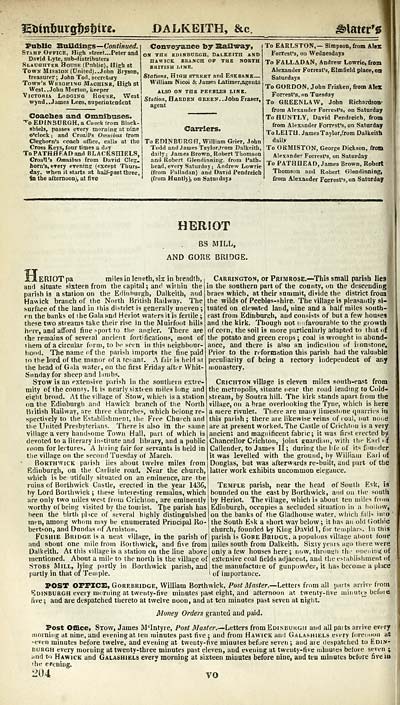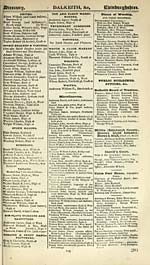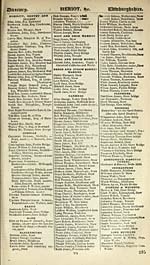Scotland > 1868, 1878 - Slater's (late Pigot & Co.'s) Royal national commercial directory and topography of Scotland > 1861
(212)
Download files
Complete book:
Individual page:
Thumbnail gallery: Grid view | List view

JEfttttfturgjjgjnri.
DALKEITH, &c.
Plater's
Public Suildings— Continued.
Stamp Office, High street...Peter and
David Lyte, sub-distributers
Slaughter House (Public), High st
Town Mission (United). .John Bryson,
treasurer; John Tod, secretary
Town's Weighinc Machine, High st
West.. John Morton, keeper
Victoria Lodging House, West
wynd.. James Lees, superintendent
Coaches and Omnibuses.
T o EDINBURGH, a Conch from Black-
shiels, passes every morning at nine
o'clock ; and Croall's Omnibus from
Cleghorn's coach office, calls at the
Cross Keys, four times a day
ToPATHHFADand BLACKSHIELS,
Croat! 's Omnibus from David Cleg.
horn's, every evening (except Thurs-
day, when it starts at ball-past three,
in the afternoon), at five
Conveyance by Railway,
ON THE EDINBURGH, DALKEITH AND
HAWICK BRANCH OP THE NORTH
BRITISH LINE.
Stations, High street and Eskbank...
William Nicol & James Latimer,agents
ALSO ON THE PEEBLES LINE.
Station, Harden geeen. . John Eraser,
agent
Carriers.
To EDINBURGH, William Grier, John
Todd and James Taylor,trom Dalkeith,
daily j James Brown, Robert Thomson
and Robert Glendinning. from Path-
bead, every Saturday; Andrew Lowrie
(from Palladan) and David Pendreich
(from Hunt!}), on Saturdays
To EARLSTON,— Simpson, from Alex
Forrest's, on Wednesdays
To FALLADAN, Andrew Lowrie, from
Alexander Forrest's, Elmfield place, on
Saturdays
To GORDON, John Frisken, from Alex
Forrest's, on Tuesday
To GREENLAW, John Richardson'
from Alexander Forrest's, on Saturday
To HUNTLY, David Pendreich, from
from Alexander Forrest's, on Saturday
ToLEITH. James Taylor ,from Dalkeith
daily
To ORMISTON, George Dickson, from
Alexande- Forrest's, on Saturday
To PATHHEAD, James Brown, Robert
Thomson and Robert Glendinning,
from Alexander Forrest's, on Saturday
HERIOT
BS MILL,
AND GORE BRIDGE.
Hi
LERIOTpa mites in lenstb, six in breadth,
anil situate sixteen from the capital ; and within the
parish is a station on the Edinburgh, Dalkeith, and
Hawick branch of the North British Railway. The
surface of the land in this district is generally uneven ;
rn the banks of the Gala and Heriot waters it is fertile;
these two streams take their rise in the Muirfoot hills
here, and afford fine sport to the angler. There are
(he remains of several ancient fortifications, most of
ihem of a circular form, to be seen in this neighbour-
hood. The name of the parish imports the fine paid
to the lord of the manor of a tenant. A fair is held at
the head of Gala water, on the first Friday after Whit-
Snnday for sheep and lambs.
Stow is an extensive parish in the southern extre-
mity of the county. It is nearly sixteen miles long and
eight broad. At the village of Stow, which is a station
on the Edinburgh and Hawick branch of the North
British Railway, are three churches, which belong re-
spectively to the Establishment, the Free Church and
the United Presbyterians. There is also in the same
village a very handsome Town Hall, pari of which is
devoted to a literary institute and library, and a public
room for lectures. A hiring fair for servants is held in
the village on the second Tuesday of March.
Borthwick parish lies about twelve miles from
Edinburgh, on the Carlisle road. Near the church,
which is be utifully situated on an eminence, are the
ruins of Borthwick Castle, erected in the year 1436,
hy Lord Borthwick ; these interesting remains, which
are only two miles west from Crichton, are eminently
worthy of being visited by the tourist. The parish has
been the birth place of several highly distinguished
men, among whom may be enumerated Principal Ro-
bertson, and Dundas of Arniston.
Fushie Bridge is a neat village, in the parish of
and about one mile from Borthwick, and five from
Dalkeith. At this village is a station on the line above
mentioned. About a mile to the north is the village of
Carrington, or Primrose.— -This small parish lies
in the southern part of the county, on the descending
braes which, at their summit, divide the district from
the wilds of Peebles-shire. The village is pleasantly si-
tuated on elevated land, nine and a half miles south-
east from Edinburgh, and consists of but a few houses
and the kirk. Though not unfavourable to the growth
of corn, the soil is more particularly adapted to that of
the potato and green crops ; coal is wrought in abund-
ance, and there is also an indication of ironstone.
Prior to the reformation this parish had the valuable
peculiarity of being a rectory independent of any
monastery.
Crichton village is eleven miles south-east from
the metropolis, situate near the road leading to Cold-
stream, by Soutra hill. The kirk stands apart from the
village, on a brae overlooking the Tyne, which is here
a mere rivulet. There are many limestone quarries in
this parish ; there are likewise veins of coal, but none
are at present worked. The Castle of Crichton is a very
ancient and magnificent fabric; it was first erected by
Chancellor Crichton, joint guardian, with the Earl of
Callender, to James II; during the life of its founder
it was levelled with the ground, by William Earl of
Douglas, but was afterwards re-built, and part of the
latter work exhibits uncommon elegauce.
Temple parish, near the head of South Esk, is
bounded on the east by Borthwick, ami on the south
by Heriot. The village, which is about ten miles from
Edinburgh, occupies a secluded situation in a hollow,
on the banks of the Gladhouse water, which falls into '
the South Esk a short way below ; it has an old (jothic
church, founded by King David 1, for templars. In this
parish is Gore Bridge, a populous village about four
miles south from Dalkeith. Sixty years ago there were
only a few houses here; now, through the opening of
extensive coal fields adjacent, and the establishment of
Stobs Mill, lying partly in Borthwick parish, and the manufacture of gunpowder, it has become a place
partly in that of Temple. I of importance.
POST OFFICE, Gorebridge, William Borthwick, Post Master. — Letters from all parts arrive from
Edinburgh every morning at twenty-five minutes past eight, and afternoon at twenty-live minutes befuie
five ; and are despatched thereto at twelve noon, and at ten minutes past seven at night.
Monet/ Orders granted and paid.
Post Office, Stow, James M'Intyre, Post Master. — Letters from Edinburgh and all parts arrive every
morning at nine, and evening at ten minutes past five ; and from Hawick and Galashiels every forenoon at
-even minutes before twelve, and evening at twenty-five miuutes befure seven; and are despatched to Edin-
burgh every morning at twenty-three minutes past eleven, aud evening at twenty-five minutes before seven ;
and to Hawick and Galashiels every morning at sixteen minutes before nine, and ten minutes before fiveiu
the evening.
204 vo
DALKEITH, &c.
Plater's
Public Suildings— Continued.
Stamp Office, High street...Peter and
David Lyte, sub-distributers
Slaughter House (Public), High st
Town Mission (United). .John Bryson,
treasurer; John Tod, secretary
Town's Weighinc Machine, High st
West.. John Morton, keeper
Victoria Lodging House, West
wynd.. James Lees, superintendent
Coaches and Omnibuses.
T o EDINBURGH, a Conch from Black-
shiels, passes every morning at nine
o'clock ; and Croall's Omnibus from
Cleghorn's coach office, calls at the
Cross Keys, four times a day
ToPATHHFADand BLACKSHIELS,
Croat! 's Omnibus from David Cleg.
horn's, every evening (except Thurs-
day, when it starts at ball-past three,
in the afternoon), at five
Conveyance by Railway,
ON THE EDINBURGH, DALKEITH AND
HAWICK BRANCH OP THE NORTH
BRITISH LINE.
Stations, High street and Eskbank...
William Nicol & James Latimer,agents
ALSO ON THE PEEBLES LINE.
Station, Harden geeen. . John Eraser,
agent
Carriers.
To EDINBURGH, William Grier, John
Todd and James Taylor,trom Dalkeith,
daily j James Brown, Robert Thomson
and Robert Glendinning. from Path-
bead, every Saturday; Andrew Lowrie
(from Palladan) and David Pendreich
(from Hunt!}), on Saturdays
To EARLSTON,— Simpson, from Alex
Forrest's, on Wednesdays
To FALLADAN, Andrew Lowrie, from
Alexander Forrest's, Elmfield place, on
Saturdays
To GORDON, John Frisken, from Alex
Forrest's, on Tuesday
To GREENLAW, John Richardson'
from Alexander Forrest's, on Saturday
To HUNTLY, David Pendreich, from
from Alexander Forrest's, on Saturday
ToLEITH. James Taylor ,from Dalkeith
daily
To ORMISTON, George Dickson, from
Alexande- Forrest's, on Saturday
To PATHHEAD, James Brown, Robert
Thomson and Robert Glendinning,
from Alexander Forrest's, on Saturday
HERIOT
BS MILL,
AND GORE BRIDGE.
Hi
LERIOTpa mites in lenstb, six in breadth,
anil situate sixteen from the capital ; and within the
parish is a station on the Edinburgh, Dalkeith, and
Hawick branch of the North British Railway. The
surface of the land in this district is generally uneven ;
rn the banks of the Gala and Heriot waters it is fertile;
these two streams take their rise in the Muirfoot hills
here, and afford fine sport to the angler. There are
(he remains of several ancient fortifications, most of
ihem of a circular form, to be seen in this neighbour-
hood. The name of the parish imports the fine paid
to the lord of the manor of a tenant. A fair is held at
the head of Gala water, on the first Friday after Whit-
Snnday for sheep and lambs.
Stow is an extensive parish in the southern extre-
mity of the county. It is nearly sixteen miles long and
eight broad. At the village of Stow, which is a station
on the Edinburgh and Hawick branch of the North
British Railway, are three churches, which belong re-
spectively to the Establishment, the Free Church and
the United Presbyterians. There is also in the same
village a very handsome Town Hall, pari of which is
devoted to a literary institute and library, and a public
room for lectures. A hiring fair for servants is held in
the village on the second Tuesday of March.
Borthwick parish lies about twelve miles from
Edinburgh, on the Carlisle road. Near the church,
which is be utifully situated on an eminence, are the
ruins of Borthwick Castle, erected in the year 1436,
hy Lord Borthwick ; these interesting remains, which
are only two miles west from Crichton, are eminently
worthy of being visited by the tourist. The parish has
been the birth place of several highly distinguished
men, among whom may be enumerated Principal Ro-
bertson, and Dundas of Arniston.
Fushie Bridge is a neat village, in the parish of
and about one mile from Borthwick, and five from
Dalkeith. At this village is a station on the line above
mentioned. About a mile to the north is the village of
Carrington, or Primrose.— -This small parish lies
in the southern part of the county, on the descending
braes which, at their summit, divide the district from
the wilds of Peebles-shire. The village is pleasantly si-
tuated on elevated land, nine and a half miles south-
east from Edinburgh, and consists of but a few houses
and the kirk. Though not unfavourable to the growth
of corn, the soil is more particularly adapted to that of
the potato and green crops ; coal is wrought in abund-
ance, and there is also an indication of ironstone.
Prior to the reformation this parish had the valuable
peculiarity of being a rectory independent of any
monastery.
Crichton village is eleven miles south-east from
the metropolis, situate near the road leading to Cold-
stream, by Soutra hill. The kirk stands apart from the
village, on a brae overlooking the Tyne, which is here
a mere rivulet. There are many limestone quarries in
this parish ; there are likewise veins of coal, but none
are at present worked. The Castle of Crichton is a very
ancient and magnificent fabric; it was first erected by
Chancellor Crichton, joint guardian, with the Earl of
Callender, to James II; during the life of its founder
it was levelled with the ground, by William Earl of
Douglas, but was afterwards re-built, and part of the
latter work exhibits uncommon elegauce.
Temple parish, near the head of South Esk, is
bounded on the east by Borthwick, ami on the south
by Heriot. The village, which is about ten miles from
Edinburgh, occupies a secluded situation in a hollow,
on the banks of the Gladhouse water, which falls into '
the South Esk a short way below ; it has an old (jothic
church, founded by King David 1, for templars. In this
parish is Gore Bridge, a populous village about four
miles south from Dalkeith. Sixty years ago there were
only a few houses here; now, through the opening of
extensive coal fields adjacent, and the establishment of
Stobs Mill, lying partly in Borthwick parish, and the manufacture of gunpowder, it has become a place
partly in that of Temple. I of importance.
POST OFFICE, Gorebridge, William Borthwick, Post Master. — Letters from all parts arrive from
Edinburgh every morning at twenty-five minutes past eight, and afternoon at twenty-live minutes befuie
five ; and are despatched thereto at twelve noon, and at ten minutes past seven at night.
Monet/ Orders granted and paid.
Post Office, Stow, James M'Intyre, Post Master. — Letters from Edinburgh and all parts arrive every
morning at nine, and evening at ten minutes past five ; and from Hawick and Galashiels every forenoon at
-even minutes before twelve, and evening at twenty-five miuutes befure seven; and are despatched to Edin-
burgh every morning at twenty-three minutes past eleven, aud evening at twenty-five minutes before seven ;
and to Hawick and Galashiels every morning at sixteen minutes before nine, and ten minutes before fiveiu
the evening.
204 vo
Set display mode to: Large image | Transcription
Images and transcriptions on this page, including medium image downloads, may be used under the Creative Commons Attribution 4.0 International Licence unless otherwise stated. ![]()
| Scottish Post Office Directories > Scotland > Slater's (late Pigot & Co.'s) Royal national commercial directory and topography of Scotland > 1861 > (212) |
|---|
| Permanent URL | https://digital.nls.uk/90203820 |
|---|
| Attribution and copyright: |
|
|---|---|
| Description | Directories of the whole, or large parts of, Scotland. |
|---|
| Description | Around 700 Scottish directories published annually by the Post Office or private publishers between 1773 and 1911. Most of Scotland covered, with a focus on Edinburgh, Glasgow, Dundee and Aberdeen. Most volumes include a general directory (A-Z by surname), street directory (A-Z by street) and trade directory (A-Z by trade). |
|---|


